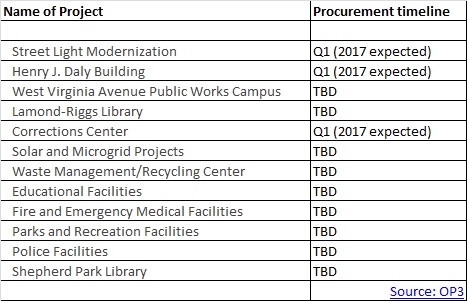Washington, DC's PPP ambitions
For the first time since the signing of its Public-Private Partnership Act in December 2014, Washington, DC has unveiled a potential pipeline of infrastructure projects it wants to develop in partnership with the private sector.
DC's Mayor Muriel Bowser, who is also the author of the state's PPP act, announced on 28 October details of the district's future PPP pipeline and introduced for the first time a two-month long open window during which the city will accept unsolicited proposals for projects.
Under the initial PPP pipeline plan, DC has identified twelve projects, the procurement process for which will be run by the Washington, DC office of PPPs (OP3). OP3 was created under the 2014 PPP Act and officially launched by Mayor Muriel Bowser on 24 November 2015.
Nearing market
OP3 has not indicated a set schedule for when tenders for each of the proposed projects would hit the market. However OP3 has completed most preliminary costs and feasibility work for three of the twelve projects that are likely to be brought to the market sooner than the rest - as early as the first quarter of 2017, according to the director of the DC OP3, Seth Miller Gabriel.
Miller Gabriel told IJGlobal that the office has been working with KPMG to complete the first phase of financial analysis for the street light modernization project. Similarly, they have engaged the Department of General Services (DGS) for the police headquarters - Henry J. Daly Building and the Corrections Centre projects.
OP3 is also understood to be in the process of hiring an external legal adviser for the proposed pipeline, a tender for the same was issued a few weeks back and an award is expected by the turn of the year, a prospective adviser told IJGlobal.
In the run up to an official launch of request for qualifications for projects, the district is already opening the window for dialogue with the private sector through a 60-day unsolicited proposals period, when firms or consortia can submit proposals for any of projects beginning 28 November 2016 through 26 January 2017.
Miller Gabriel says depending on the outcome of this first round, the P3 office might consider future rounds also. States like Pennsylvania and Florida both run unsolicited proposal periods each year and have had success with launching projects as a result of receiving an unsolicited proposal. Pennsylvania's unsolicited proposals programme runs twice a year in May and October.
Contract structure
10 of the 12 projects belong to the social infrastructure and buildings sector with one waste recycling and one renewable energy project - where the district hopes to develop solar arrays, microgrid systems, integrated battery storage, and other alternative energy solutions. The hope is to also consider transit projects in the future, although DC's previous PPP pursuit - the DC streetcar project - was eventually cancelled due to budgetary constraints.
Miller Gabriel says the ten building specific projects will be entirely for government office use and will not feature any commercial or retail elements implying that the buildings would not be revenue generating assets. The OP3 expects to structure them as availability payment based projects where the district would typically pay the private concessionaire over a longer-period, with progress payments made during construction and over the course of operation and maintenance. The district is certain it would receive a better standard and more efficiency if the private concessionaire would operate and maintain the buildings. "We think instead of issuing our own public bonds and possibly poorly maintaining buildings, if the eventually chosen concessionaire is efficient, the costs could go down," says Miller Gabriel.
As such there are only a handful of availability payment based social infrastructure deals that have successfully closed in the US since the first such closed in Long Beach, California in 2010. The majority are still revenue backed projects such as university parking leases and student housing projects. So it would be a wait and watch to see how successful DC is with its latest venture.
But the district is keen to learn from and bring in Canadian expertise in its programme, according to Miller Gabriel. Canada has been both an early champion of the PPP model and successful developer of several hospital and government building projects under its availability-payment equivalent delivery model (AFP). Equally Washington, DC's PPP legislature and the project structures, says Miller Gabriel, build upon the success' of neighboring states like Virginia and Maryland as also Florida that have been using the model to rebuild their infrastructure over the past few years.
By establishing a centralised PPP office and having clear political support from the Mayor, who still has another two-years in the office, Washington, DC's hope is to become the PPP capital of the US.
Request a Demo
Interested in IJGlobal? Request a demo to discuss a trial with a member of our team. Talk to the team to explore the value of our asset and transaction databases, our market-leading news, league tables and much more.


